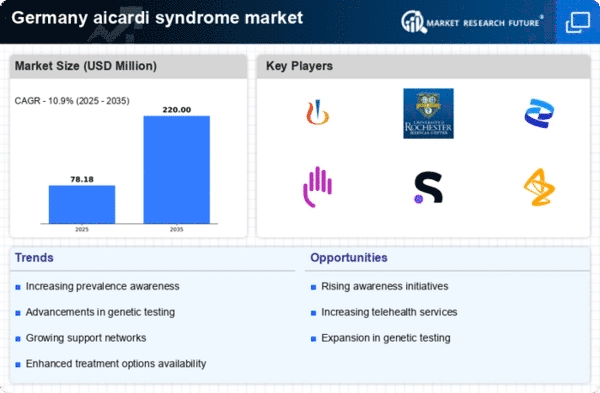Advancements in Genetic Research
Advancements in genetic research are significantly influencing the aicardi syndrome market. In Germany, ongoing studies are uncovering the genetic underpinnings of Aicardi syndrome, which is primarily linked to mutations in the X chromosome. These discoveries are paving the way for the development of targeted therapies and personalized treatment plans. As genetic testing becomes more accessible, healthcare providers are better equipped to diagnose Aicardi syndrome early, which is crucial for effective management. The integration of genetic research into clinical practice is expected to enhance the understanding of the disease and improve patient outcomes. Consequently, the aicardi syndrome market may witness an increase in demand for genetic testing services and related therapeutic interventions, reflecting the potential for innovation in treatment approaches.
Rising Awareness of Aicardi Syndrome
The increasing awareness of Aicardi syndrome among healthcare professionals and the general public is a crucial driver for the aicardi syndrome market. Educational initiatives and campaigns are being implemented to inform about the symptoms and implications of this rare condition. As awareness grows, more patients are likely to seek medical advice, leading to higher diagnosis rates. In Germany, the prevalence of Aicardi syndrome is estimated to be around 1 in 100,000 live births, which indicates a need for specialized care and treatment options. This heightened awareness is expected to stimulate demand for diagnostic tools and therapeutic interventions, thereby expanding the aicardi syndrome market. Furthermore, the involvement of patient advocacy groups plays a significant role in promoting understanding and support for affected families, which may further drive market growth.
Government Support and Funding Initiatives
Government support and funding initiatives for rare diseases, including Aicardi syndrome, are pivotal in shaping the aicardi syndrome market. In Germany, various programs are being implemented to enhance research, improve treatment accessibility, and support affected families. The government has allocated substantial funds to promote research into rare genetic disorders, which may lead to breakthroughs in understanding Aicardi syndrome. Additionally, financial assistance programs are being developed to help families cover the costs of treatment and care. This support not only alleviates the financial burden on families but also encourages pharmaceutical companies to invest in the development of new therapies. As a result, the aicardi syndrome market is likely to experience growth driven by increased research activity and improved patient access to innovative treatments.
Development of Specialized Treatment Facilities
The establishment of specialized treatment facilities for Aicardi syndrome is emerging as a significant driver in the aicardi syndrome market. In Germany, healthcare infrastructure is increasingly focusing on rare diseases, leading to the creation of centers of excellence that cater specifically to patients with Aicardi syndrome. These facilities are equipped with multidisciplinary teams, including neurologists, geneticists, and rehabilitation specialists, who provide comprehensive care. The presence of such specialized centers not only enhances patient outcomes but also encourages research and development of targeted therapies. As these facilities become more prevalent, they are likely to attract more patients, thereby increasing the demand for treatments and services associated with Aicardi syndrome. This trend indicates a positive trajectory for the aicardi syndrome market, as it aligns with the growing emphasis on personalized medicine.
Increased Collaboration Among Research Institutions
Increased collaboration among research institutions is emerging as a vital driver for the aicardi syndrome market. In Germany, partnerships between universities, hospitals, and pharmaceutical companies are fostering a collaborative environment for research and development. These alliances are aimed at sharing knowledge, resources, and expertise to accelerate the discovery of new treatments for Aicardi syndrome. Collaborative research initiatives are likely to lead to more comprehensive clinical trials and a better understanding of the disease's mechanisms. This synergy not only enhances the potential for innovative therapies but also strengthens the overall research landscape for rare diseases. As a result, the aicardi syndrome market may benefit from a more robust pipeline of treatment options, ultimately improving patient care and outcomes.

















Leave a Comment